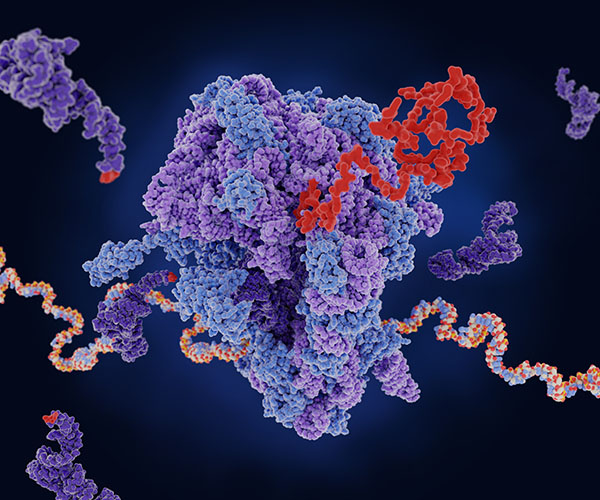
A ribosome (center) translates mRNA (multi-colored strand) into a protein (red). tRNA (dark purple) carries amino acids to add to the growing chain.
Messenger RNA (mRNA) contains instructions for building a protein. During the process of translation, which occurs at ribosomes, transfer RNAs (tRNAs) serve as bridges connecting the mRNA sequence to the amino acid building blocks of proteins. Each tRNA recognizes one or more 3-letter mRNA sequences, or codons, specific for its attached amino acid. To start translation, the ribosome assembles around the mRNA and the initiator tRNA, which recognizes the typical start codon (AUG). Proteins called initiation factors help stabilize this ribosomal initiation complex.
- In organisms from yeast to humans, starting translation often involves the initiation factor eIF2, which helps form the complex that delivers the initiator tRNA to the ribosomal initiation complex that scans the mRNA for the AUG start codon. Prior studies have suggested that an auxiliary initiation factor, eIF2A, can substitute for eIF2 to recruit the ribosomal complex to specialized mRNAs and to initiate translation at non-AUG start codons. However, the precise role of eIF2A in cells remains poorly understood.
- Work in yeast by the Hinnebusch Lab showed that eIF2A plays a minimal role in initiating translation, even under stress conditions in which eIF2 function is lowered.
- Yeast engineered to lack eIF2A did not have reduced translation efficiencies compared to typical yeast. Starving typical yeast cells led to changes in the translation efficiencies of hundreds of mRNAs. Starvation induced an almost identical profile of translation changes in the eIF2A-depleted cells.
- The scientists found no evidence that eliminating eIF2A changes the translation of specialized mRNAs or those with non-AUG start codons. They conclude that very few mRNAs use eIF2A for tRNA recruitment in yeast cells, even when eIF2 function is lowered by stress.
Reference
Gaikwad S, Ghobakhlou F, Zhang H, Hinnebusch AG. Yeast eIF2A has a minimal role in translation initiation and uORF-mediated translational control in vivo. eLife DOI: 10.7554/eLife.92916 (2024)
Learn more about the Cell Regulation and Development group: https://www.nichd.nih.gov/about/org/dir/affinity-groups/CRD
 BACK TO TOP
BACK TO TOP